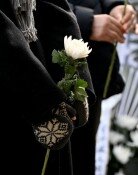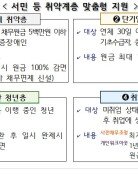Vaccination is still necessary
Vaccination is still necessary
Posted March. 23, 2021 07:57,
Updated March. 23, 2021 07:57
COVID-19 vaccination for people aged 65 or older at care hospitals will begin today. It is in accordance with the announcement made on Monday by the Korea Disease Control and Prevention Agency’s inoculation committee that there is no connection between AstraZeneca’s vaccine and the formation of blood clots and that those in line for vaccination should proceed without delay. Vaccination for the general public aged 65 or older will start in April. President Moon Jae-in and the First Lady will receive AstraZeneca’s vaccine on Tuesday to attend the G7 summit to be held in June in the U.K.
However, concerns about vaccines are still lingering. Only 77 percent of those over 65 years old have agreed to inoculation. Some have agreed and canceled later. While the South Korean government mostly secured AstraZeneca’s vaccine for the first half of the year, the vaccine in question is raising the issues of effectiveness against the elder and blood clot formation.
Part of the blame is on the government’s failed communication. The government waited five days to reveal that a woman in her 60s who died after vaccination developed blood clots. While officials claim that they wanted to be careful and wait for official autopsy results, it was enough to make people question whether the government is hiding something. Its failure to quickly respond to young people who experienced severe side effects after receiving AstraZeneca’s vaccine also added to anxiety.
In a situation with no alternatives other than vaccines to end the pandemic, lasting concerns about vaccines are alarming. Trust in vaccines, once cracked, will be hard to recover. Trust in vaccine-related leadership should be restored based on easy-to-understand, transparent, and prompt communication with scientific facts. In fact, a detailed examination is required for a man in his 20s who developed blood clots after vaccination, similar to the case of a woman in her 60s. The results of additional examination and measures to be taken should be disclosed truthfully.
Only around 670,000 people have been vaccinated as of 12:00 a.m. Monday, which is less than two percent of the vaccinated populations – 36.27 million – required for herd immunity. The inoculation plan in the second quarter may be hindered due to the shortage of vaccine supply. The fourth wave of infections is possible, as the number of new daily COVID-19 patients has been over 400 for six consecutive days, people’s movements have increased, and variants of COVID-19 are spreading. Faster vaccination is the solution to control the spreading of the virus. The government needs to ensure contracted vaccines’ timely import and strive to secure more supply.






